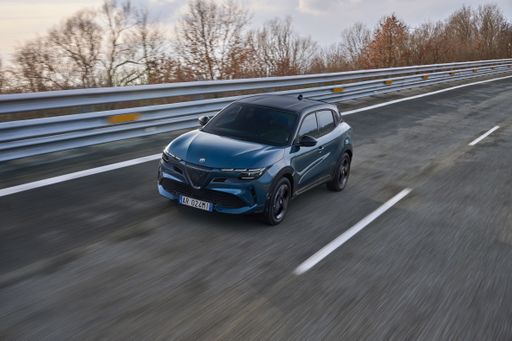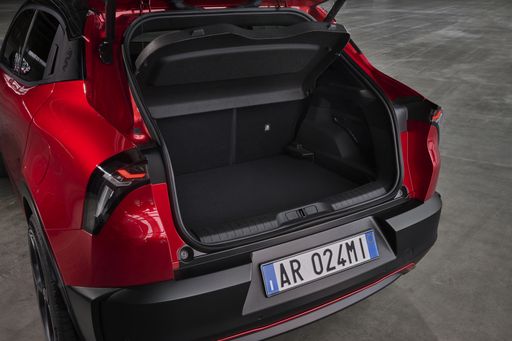Alfa Romeo Junior vs Vauxhall Vivaro – Which model is better for everyday use?
Compare performance, boot capacity, efficiency and price at a glance.
Find out which car is the better choice for you – Alfa Romeo Junior or Vauxhall Vivaro?
Costs and Efficiency:
When it comes to price and running costs, the biggest differences usually appear. This is often where you see which car fits your budget better in the long run.
Alfa Romeo Junior has a evident advantage in terms of price – it starts at 25700 £, while the Vauxhall Vivaro costs 33200 £. That’s a price difference of around 7530 £.
Fuel consumption also shows a difference: Alfa Romeo Junior manages with 4.80 L and is therefore noticeable more efficient than the Vauxhall Vivaro with 6.20 L. The difference is about 1.40 L per 100 km.
In terms of energy consumption, the advantage goes to the Alfa Romeo Junior: with 15.10 kWh per 100 km, it’s clearly more efficient than the Vauxhall Vivaro with 23.60 kWh. That’s a difference of about 8.50 kWh.
As for range, the Alfa Romeo Junior performs somewhat better – achieving up to 410 km, about 58 km more than the Vauxhall Vivaro.
Engine and Performance:
Power, torque and acceleration are the classic benchmarks for car enthusiasts – and here, some clear differences start to show.
When it comes to engine power, the Alfa Romeo Junior has a noticeable edge – offering 280 HP compared to 180 HP. That’s roughly 100 HP more horsepower.
In acceleration from 0 to 100 km/h, the Alfa Romeo Junior is convincingly quicker – completing the sprint in 5.90 s, while the Vauxhall Vivaro takes 10.50 s. That’s about 4.60 s faster.
In terms of top speed, the Alfa Romeo Junior performs a bit better – reaching 206 km/h, while the Vauxhall Vivaro tops out at 185 km/h. The difference is around 21 km/h.
There’s also a difference in torque: Vauxhall Vivaro pulls to a small extent stronger with 400 Nm compared to 345 Nm. That’s about 55 Nm difference.
Space and Everyday Use:
Beyond pure performance, interior space and usability matter most in daily life. This is where you see which car is more practical and versatile.
Seats: Vauxhall Vivaro offers significantly more seating capacity – 9 vs 5.
In curb weight, Alfa Romeo Junior is evident lighter – 1380 kg compared to 1722 kg. The difference is around 342 kg.
In maximum load capacity, the Vauxhall Vivaro performs decisively better – up to 6100 L, which is about 4820 L more than the Alfa Romeo Junior.
When it comes to payload, Vauxhall Vivaro significantly takes the win – 1226 kg compared to 420 kg. That’s a difference of about 806 kg.
Who comes out on top?
Overall, the Alfa Romeo Junior shows itself to be has a very small edge and secures the title of DriveDuel Champion.
It convinces with the more balanced overall package and proves to be the more versatile choice for everyday use.
 @ Alfa Romeo / Stellantis Media
@ Alfa Romeo / Stellantis Media
Alfa Romeo Junior
Alfa Romeo Junior
The Alfa Romeo Junior captures the essence of Italian design with its sleek lines and compact dimensions, making it an icon of elegance and performance. With a spirited driving experience and a charming retro aesthetic, it appeals to enthusiasts and casual drivers alike. This delightful car embodies the brand's rich heritage while remaining a fun and engaging option for those seeking a unique automotive experience.
details @ Alfa Romeo / Stellantis Media
@ Alfa Romeo / Stellantis Media
 @ Alfa Romeo / Stellantis Media
@ Alfa Romeo / Stellantis Media
 @ Alfa Romeo / Stellantis Media
@ Alfa Romeo / Stellantis Media
Vauxhall Vivaro
The Opel Vivaro is a versatile van that excels in both practicality and comfort, making it a popular choice for businesses and families alike. Its sleek design is complemented by a spacious interior, providing ample room for passengers or cargo. With a focus on durability and performance, this vehicle is well-suited for long journeys and demanding workloads.
details
 @ Alfa Romeo / Stellantis Media
@ Alfa Romeo / Stellantis Media
|
|
|
|
|
Costs and Consumption |
|
|---|---|
|
Price
25700 - 41600 £
|
Price
33200 - 52500 £
|
|
Consumption L/100km
4.8 - 5.4 L
|
Consumption L/100km
6.2 - 7 L
|
|
Consumption kWh/100km
15.1 - 17.5 kWh
|
Consumption kWh/100km
23.6 - 24 kWh
|
|
Electric Range
344 - 410 km
|
Electric Range
221 - 352 km
|
|
Battery Capacity
0.4 - 51 kWh
|
Battery Capacity
-
|
|
co2
0 - 119 g/km
|
co2
0 - 184 g/km
|
|
Fuel tank capacity
44 - 45 L
|
Fuel tank capacity
69 L
|
Dimensions and Body |
|
|---|---|
|
Body Type
SUV
|
Body Type
Cargo Van, Bus
|
|
Seats
5
|
Seats
3 - 9
|
|
Doors
5
|
Doors
4
|
|
Curb weight
1380 - 1689 kg
|
Curb weight
1722 - 2260 kg
|
|
Trunk capacity
340 - 415 L
|
Trunk capacity
-
|
|
Length
4173 mm
|
Length
4980 - 5331 mm
|
|
Width
1781 mm
|
Width
1920 mm
|
|
Height
1505 - 1538 mm
|
Height
1890 - 1935 mm
|
|
Max trunk capacity
1205 - 1280 L
|
Max trunk capacity
3200 - 6100 L
|
|
Payload
390 - 420 kg
|
Payload
840 - 1226 kg
|
Engine and Performance |
|
|---|---|
|
Engine Type
Electric, Petrol MHEV
|
Engine Type
Electric, Diesel
|
|
Transmission
Automatic
|
Transmission
Automatic, Manuel
|
|
Transmission Detail
Dual-Clutch Automatic, Reduction Gearbox
|
Transmission Detail
Reduction Gearbox, Manual Gearbox, Automatic Gearbox
|
|
Drive Type
Front-Wheel Drive, All-Wheel Drive
|
Drive Type
Front-Wheel Drive
|
|
Power HP
136 - 280 HP
|
Power HP
120 - 180 HP
|
|
Acceleration 0-100km/h
5.9 - 9.1 s
|
Acceleration 0-100km/h
10.5 - 14.3 s
|
|
Max Speed
150 - 206 km/h
|
Max Speed
130 - 185 km/h
|
|
Torque
230 - 345 Nm
|
Torque
260 - 400 Nm
|
|
Number of Cylinders
3
|
Number of Cylinders
4
|
|
Power kW
100 - 207 kW
|
Power kW
88 - 132 kW
|
|
Engine capacity
1199 cm3
|
Engine capacity
1499 - 2184 cm3
|
General |
|
|---|---|
|
Model Year
2024 - 2025
|
Model Year
2024 - 2025
|
|
CO2 Efficiency Class
A, C, D
|
CO2 Efficiency Class
A, F, G
|
|
Brand
Alfa Romeo
|
Brand
Vauxhall
|
What drive types are available for the Alfa Romeo Junior?
Available configurations include Front-Wheel Drive or All-Wheel Drive.
The prices and data displayed are estimates based on German list prices and may vary by country. This information is not legally binding.
